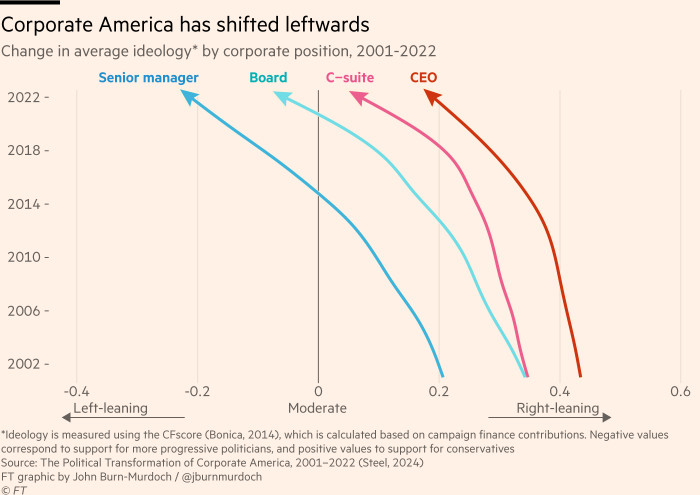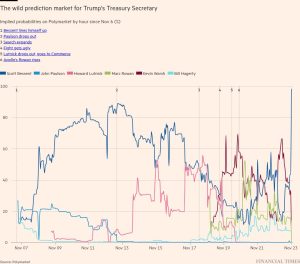Yes, CEOs are moving left, but ‘woke capitalism’ is not the whole story

Unlock the Editor’s Digest for free
Roula Khalaf, Editor of the FT, selects her favourite stories in this weekly newsletter.
Corporate historians will look back on the past 10 years as the decade in which ROI and P&Ls were overtaken by ESG and DEI.
The pace of the shift in corporate culture and communications — from predominantly conservative and understated to increasingly progressive and activist — has been stunning. In a rare case of bipartisan unity in these polarised times, business leaders on both the left and right agree that firms have moved leftward.
Where the two sides do disagree is in theories on what’s driving this shift. The “woke capitalism” framing favoured by many conservatives argues that the move is a cynical ploy. In Ross Douthat’s original formulation, corporate activism on social and environmental issues is a shield, signalling virtue to consumers and regulators in the hope of ensuring profit margins remain untouched.
The progressive counter view is the “stakeholder capitalism” framing: socially conscious execs have simply broadened the pool of stakeholders they are beholden to. This now includes not only shareholders and their customers but wider society and the planet.
Which version is closer to the truth?
Last week we got a strong indication that it’s the latter, in the form of a fascinating new piece of research by Reilly Steel, a political scientist at New York’s Columbia Law School. This finds that the political views of America’s corporate elite have shifted significantly to the left in the past two decades, and that this change in managerial class values has driven the recent wave of corporate social activism.

Using data on millions of political donations made by tens of thousands of executives, board members and senior managers since 2001, Steel finds that the median US CEO is no longer solidly on the right. Instead, he or she is now a political moderate, while senior managers today are overwhelmingly left-leaning.

This is mirrored in my own analysis of Britain’s corporate upper echelons. In 2024, this group was more likely to vote for and donate to the Labour party than the Conservatives for the first time since data became available.
Evidently the corporate world is not immune from the broader political realignment of recent decades, which has seen a shift from the rich supporting conservatives to the highly-educated backing progressives.
To be clear, the fact that corporate leaders have become more leftwing doesn’t in and of itself refute the idea that the rise of ESG, DEI and corporate social activism are virtue signalling ploys.
But further research from Steel finds that firms with more right-leaning executives and directors are less likely to take public stands on progressive issues. This is a strong indication that the shift in corporate culture and behaviour is more accurately viewed as a sincere step, reflecting the demands or desires of key stakeholders, than as a cynical strategic play.
Of course, sincere doesn’t necessarily mean entirely wise, or even effective on its own terms, as demonstrated by the Disney debacle or the ESG mess. But even if particular forms of progressivism may now be on the wane, the leftward shift of C-suites and management means the general trend towards companies acting and speaking in consideration of the wider social context is probably here to stay.
That may be welcome or irritating depending on your perspective. More unambiguously ominous is the fact that the political transformation of the corporate world has not been a single directional shift: polarisation is also increasing.
Both Steel and a separate team of US finance professors find that the share of companies with overwhelmingly left-leaning or right-leaning leadership teams is rising, leading to increased rates of disruption when political misfits leave or are pushed out.

The recent splintering of Silicon Valley into an increasingly outspoken conservative venture capital industry and a still left-leaning broader tech sector appears emblematic of this wider trend. Recent changes to Elon Musk’s social media platform X are a reminder that corporations embodying the values of their leadership will not always point in a progressive direction.
The shift towards a more activist, political and socially conscious corporate sphere may be a sincere reflection of the changing values of the managerial class, but that doesn’t mean it has no drawbacks. The path from corporate activism to progressive outcomes might not be as short or as straight as its proponents had hoped.
[email protected], @jburnmurdoch
Data sources and methodology
Both the Steel paper and the additional FT analysis of Silicon Valley infer corporate political ideology from individuals’ political campaign contributions, using Adam Bonica’s Database on Ideology, Money in Politics, and Elections (DIME).
Importantly, this campaign finance measure of ideology (the CFscore) does not simply categorise donations by political party. Contributions made to progressive Democrats like Alexandria Ocasio-Cortez are coded as more leftwing than donations to more conservative Democrats like Joe Manchin, and similarly a donation to Donald Trump is coded as more rightwing than one to Lindsey Graham.
As a result, a corporate executive’s inferred ideology reflects not only how much money they donated to each party, but how politically moderate or hardline were the particular politicians or political action committees they contributed to.
#CEOs #moving #left #woke #capitalism #story




